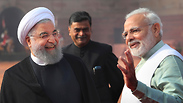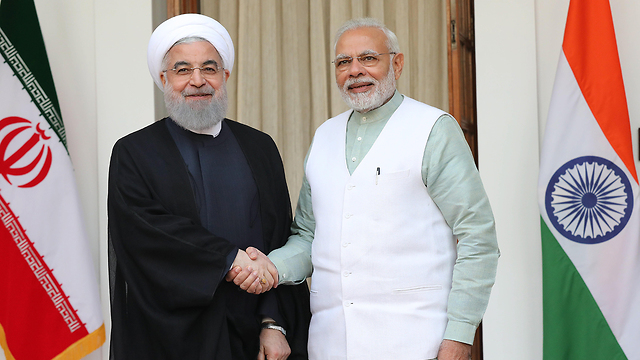

India iterates willingness to only follow international Iran sanctions
South Asian giant states it only abides by sanctions imposed by UN, not by any other country, including US; country's foreign affairs minister to meet Iranian counterpart, who seeks to build support against US rejection of nuclear accord.
While many European companies suspended their business dealings with Iran amid concerns new sanctions will be imposed on the Islamic republic after the US withdrew from the 2015 nuclear deal, the Asian juggernaut—itself a nuclear power—maintained its independent stance regarding any such sanctions.
India only abides by sanctions imposed by the United Nations and not those imposed by any other country, such as ones announced by the United States against Iran, India's foreign minister said on Monday.
US President Donald Trump this month withdrew the United States from the Iran nuclear deal and ordered the re-imposition of US sanctions against Iran that were suspended under the 2015 accord.
But Indian Foreign Minister Sushma Swaraj said New Delhi's position was independent of any other country.
"India follows only UN sanctions and not unilateral sanctions by any country," she said at a news conference in response at a question on India's response to the US decision.
India and Iran have long-standing political and economic ties, with Iran one of India's top oil suppliers. At the same time, India has a very warm relationship with Israel.
Later on Monday, Swaraj will meet Iranian Foreign Affairs Minister Mohammad Javad Zarif, who arrived in New Delhi to build support against the US rejection of the nuclear accord.
Since Trump's decision to abandon the nuclear deal, European states have been trying to ensure Tehran receives enough benefits to persuade it to maintain the accord. Iran is pressing Europe for a package of economic measures to offset the effects of the US pullout.
"It's better that European countries continue their current action to persuade America to keep its promises in the nuclear deal and for that country to effectively execute the deal in all its parts with good will and in a productive atmosphere," said Iran's Deputy Foreign Affairs Minister Abbas Araghchi.
Russia's President Vladimir Putin said last week that the US's decision to pull out of the nuclear deal was unilateral and not useful. "American zigzagging on international accords following US elections creates distrust between countries," Putin said.
"We are prepared for a dialogue with Trump, but currently a meeting is not on the agenda," Russia's president added.
















